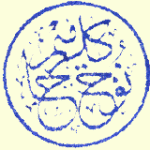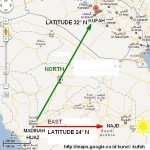-
Pilgrimage to the Garden.
By Ayman Ahwal
Categories : The Environment
The modern world with its secular leanings may well mock religion and its validity as a positive factor in human development. But it is true to say that religion does institutionalise in people a special brand and hierarchy of respect of a kind that is not to be found in other areas of human activities. Of course, this particularly religious brand of respect affects those adepts of the religion broadly considered as being believers. Respect or repulsion for categories of people, places or phenomena varies according to each religion. Thus we find Hindus harbouring special respect for cows, Muslims lack of respect for pigs and dogs, Buddhists’ veneration for remote and wild places. Since the so-called “enlightenment” Judeo-Christians’ respect has been focussed on “science” and “reason” in slavish unison with secularists, while respect for other phenomena and features of creation is often discarded as superstition.
In the Muslim hierarchy of revelation (i.e. spiritual development) the first tradition (sunnah) is that of Adam. The sunnah of Adam is common to all three of the monotheist traditions, and has similar manifestations in other religious. This sunnah or tradition is variously referred to as the knowledge of right and wrong. It can be said that the tradition of the right hand and the left hand is of the sunnah of Adam. Modern man in common with people of all religions as well as with indigenous peoples offers the right hand in greeting rather than the left hand. This is no modern convention or mere etiquette, exclusive to “civilized” or “developed” peoples but dates back from time immemorial. In fact it can be seen as part of the common tradition of Adam and a primordial part of man’s psyche. But it is without doubt the Muslims who are most meticulous in keeping to its strictures. The reasons are not only a question of ritual honour but also concern the more practical considerations of hygiene. Even the well known biblical exhortation “let not the right hand know what the left hand does” tends to have lost its precise and practical meaning for Christians, whereas it is strictly adhered to by Muslims and daily ritualized in the obligatory act of ablution. It is well known to Muslims that without ablution the obligatory five prayers are deemed invalid.
Part of the perceived function of (any) religion is to relate man to his own destiny and to the cosmos from the beginning of creation to its end transcending the scope of his own individual life span. It is true that since some five centuries mankind has by science and reason vastly increased his knowledge of the Cosmos and indeed of many of the functions of life in its multifarious forms on the planet. But it seems to be endemic that as functional knowledge of the creation has increased, respect for it has diminished. Perhaps, as a well known saying implies, familiarity with its intimate workings has bred contempt. Indeed often “scientific” knowledge of the functions of life forms and natural phenomena has only served to intensify their exploitation. By the time the scientific community has realised the damage done to the environment, the processes of exploitation have advanced too far to a point where conservation or readjusting the balance has become difficult if not impossible.
Such is public confidence in scientific solutions for all matters that, inevitably, to correct matters yet more scientific remedies are investigated and deployed and the cycle is perpetuated. Environmental balance has by now been so shattered until the entire world with its resources and bounties spiral out of control as species are lost, entire landscapes destroyed, climates irreparably altered and sustainable human life itself is threatened in so many places all over the planet. Wars between nations with ever more destructive weapons have added to the devastation caused by man’s war against the environment. With global warming and other symptoms of environmental balance it is the very survival of the planet and life on it that is in question.
Islam and the Muslims have their share and duty towards mankind as a whole for the protection of the environment, and to draw attention towards the dangers caused by its destruction. Indeed Islam has as many if not more indications of how this should be done than perhaps any other world view or religion. The Islamic tradition is particularly rich in preserving to this day its sacred sciences combined with a love and respect for the environment. The ethical dimensions of life grounded on revelation is still strong among Muslims. What can be described as a theology of nature has not been forgotten or discarded by Muslims, whereas in the Christian or so called modern world it has been replaced by a view conditioned by the quantitative sciences. This ethical interpretation of life can be more easily appealed to among Muslims than is the case of many sections of western society or even of other religious communities.
Over the course of the past few centuries, management of and influence on the world’s affairs have been removed from the hands and preoccupations of Muslims. The religious observances of Muslims’ have been increasingly confined to matters of personal piety. But this does not mean that Islam is devoid of practical guidelines for public affairs. On the contrary, although nowadays practicing Muslims may appear to be more concerned with issues of personal piety, Islam is a highly practical religion in its prescriptions for temporal activities. As with the environment’s bio-diversity where so many species are now being destroyed before they and their potential use for the benefit of mankind are discovered, so also the world is witness to the destruction of the Islamic civilization before its full potential and practicalities have been realized. For there are indeed therein ways and means whereby in a last hope for humanity we may well discover just in time the wherewithal of revival and survival of the planet and its multifarious species. Before the public and managerial applications of Islam are destroyed together with the environment by the dominant secular world view, the world should take note and make use of the one in a last hope to save the other.
Nature and its manifestations are seen in Islam and by Muslims as being essential vehicles of Allah’s signs as al-Muhit (Allah) is manifested in all things. The task of saving the natural order from a humanity that has lost its way and its vision of man’s place within the creation is indeed a daunting one. The tools whereby this is done can amply be found from within the sacred sources of Islam and the sharia’ah, Islamic law. As methods based on the sharia’ah are elaborated they by definition command the respect and undivided support of Muslims. Subsequently we will be able to look forward to seeing Muslims as being the most eloquent defenders of the planet’s natural environment. Muslims, who are the most equipped by dint of their religion and preserved traditions to take up this momentous task, would be failing the world if they failed to take up the challenge. This may well constitute a rare opportunity for Muslims to excel in the modern world and to regain the esteem of humanity. For the world now gasps desperately for solutions to the imbalances in the environment caused by centuries of abuse and tyranny. Clear guidance and unequivocal action is indeed the true nature of Khilafah. To remind humanity of the Unity (and inter-connectibility) of Allah’s creation is of the veritable essence of Tawhid.
To remind Muslims and thereby the world of the Tropical Rainforest of Belum as being of the very substance and essence of the Original Garden and a cradle of creation, which it is by scientific consensus, is to raise its status of respect in the hearts and minds of people. Belum as one of the most ancient forests extant in the world thus deserves the highest honour and respect that Muslims can accord to a place: Haram Sharif. That thereby we are reminded of Sayyedna Adam, the first prophet of Islam is not merely a religious or sectarian conceit but embodies a practical intention and method. The most effective prerequisite and tool for the conservation of Nature is respect. Muslims are constantly reminded that Islam consists of respect (adab).
The continued destruction of nature is a mirror image of man’s moral and spiritual degradation. The conservation of Nature is a matter of spiritual reconstruction for mankind. Continued insouciance of this awareness will result in the destruction not only of man’s environment but also of man himself. As the destruction continues it is high time that we remembered the Original Garden, hopefully before it is too late. Thus the intentions and the method must be founded on a spiritual bedrock of certainty. As Sayyed Hossain Nasr says,”It is nature as Allah’s primordial creation that will have the final say”.
About the Author
Ayman Ahwal (RahimAllah) was a British journalist, film-maker, craftsman and environmentalist who campaigned for the protection of threatened rainforests in Malaysia and Indonesia. He converted to Islam in the late ’60s, while in the Moroccan desert. He travelled extensively across the world. Having spent many years living in the wildernesses, he firmly believed in the interconnectedness of all life.
May Allah raise his rank and forgive his shortcomings.






